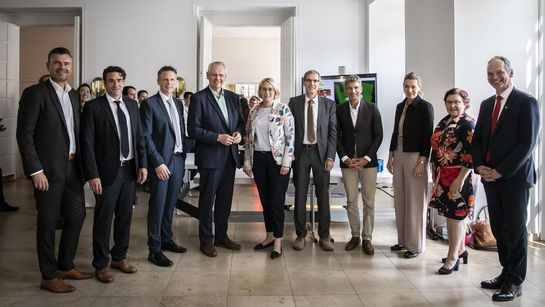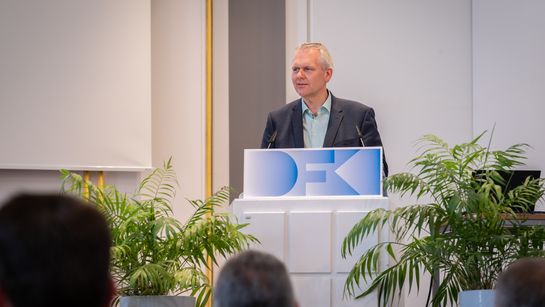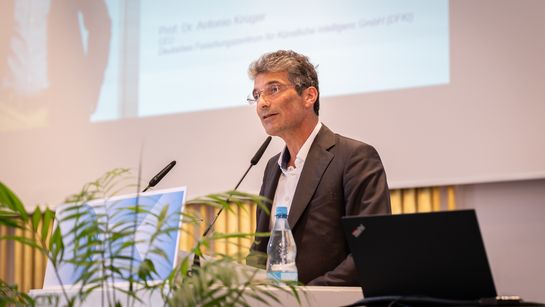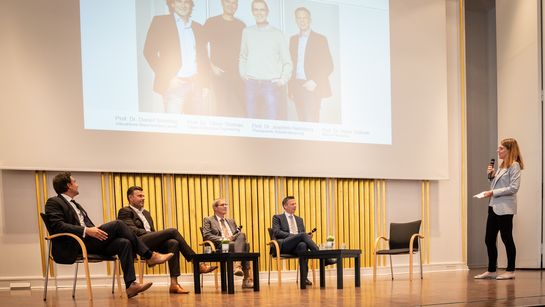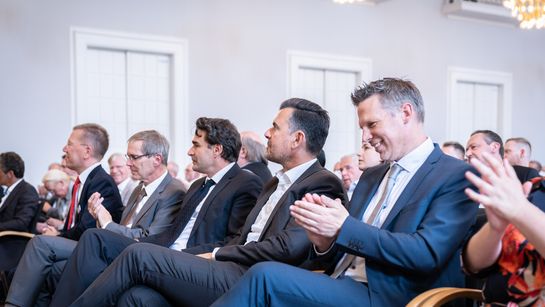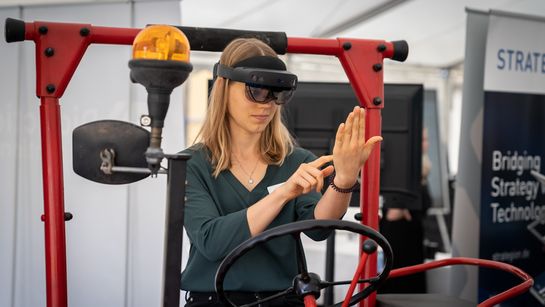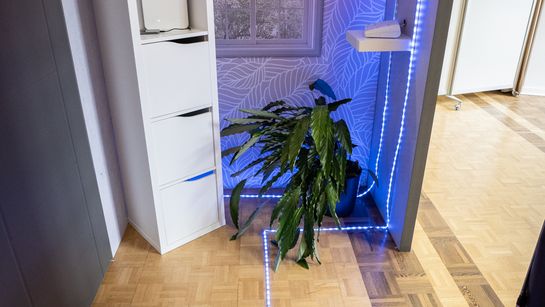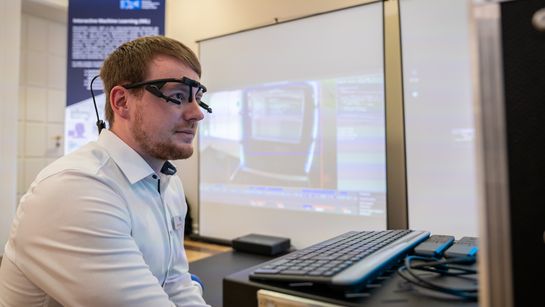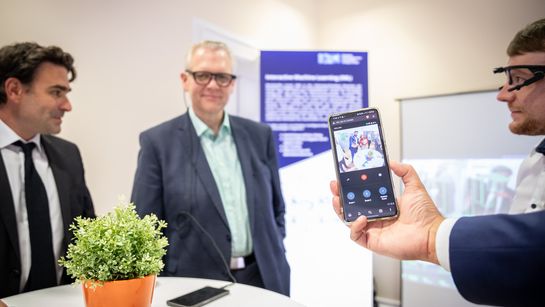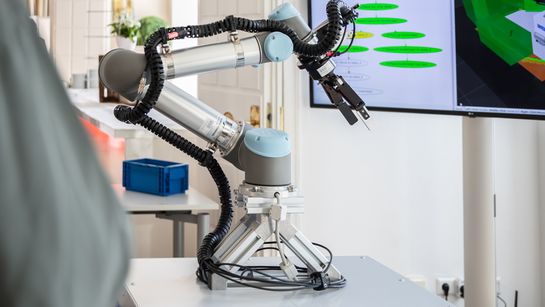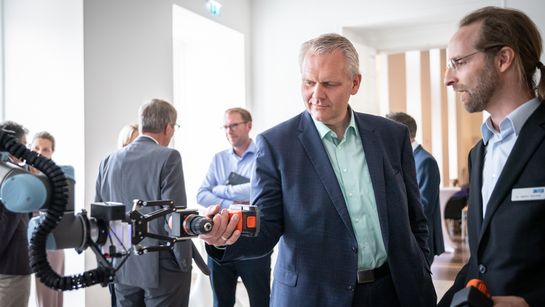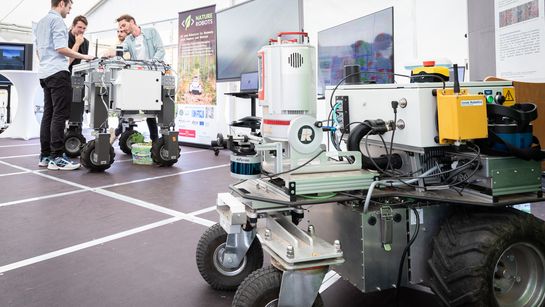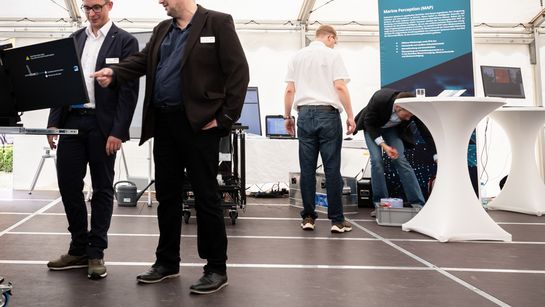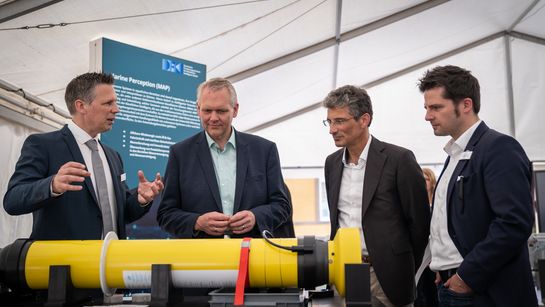The establishment as a DFKI location – in addition to Kaiserslautern, Saarbrücken and Bremen – goes back to the decision of the Supervisory Board at the beginning of May this year. At the earliest possible opportunity, the board had certified the excellent work of the four research departments in Lower Saxony and decided the admittance of Lower Saxony without any dissenting votes. Björn Thümler, Lower Saxony's Minister of Science and Culture, was among the first to offer his congratulations and emphasized that Lower Saxony is now finally listed on the AI map.
At the ceremonial opening in Osnabrück Castle, the minister again expressed his delight at the successful alliance. "Today is a good day for Lower Saxony and a good day for the German Research Center for Artificial Intelligence: the DFKI has found a new, additional home in Osnabrück and Oldenburg”, said Minister Thümler. "This is a great achievement for us as a state. Our regional companies and universities benefit just as much as the cities of Osnabrück and Oldenburg from the international appeal and expertise of this new partner."
The state had supported the establishment of the DFKI in Lower Saxony from the very beginning. With funding of almost 1.9 million euro from Volkswagen Foundation’s “Niedersächsisches Vorab” funding initiative, a branch office of the DFKI location in Bremen was initially opened at the University of Osnabrück in 2011. At the beginning of 2019, the establishment of the DFKI Lab Niedersachsen then followed with branches in Osnabrück and Oldenburg. The lab was supported by funding of over 17.5 million euros from the “Niedersächsisches Vorab” for the period April 2019 to March 2024 and is based on a cooperation agreement between the state of Lower Saxony, the DFKI, and the universities in Osnabrück and Oldenburg.
Classical win-win relationship
“DFKI and Lower Saxony are a classic win-win relationship”, DFKI CEO Prof. Dr. Antonio Krüger affirmed: “At the Hannover Messe 2019, we jointly launched the three-year DFKI Lab phase, which after a deep evaluation by the DFKI Supervisory Board and the Lower Saxony state government has now been concluded very positively. With the now unlimited establishment of the new full-fledged site, DFKI has gained additional clout and Lower Saxony has another beacon on the map of application-inspired AI excellence.”
The four research department heads are optimally networked with the regional economy and the international AI science world, Krüger continued: “They are broadly positioned in terms of content and have teams with outstanding researchers for the concrete application of AI technologies in production and services, in agricultural, medical, but also marine and environmental technologies.
We look forward to continuing successful cooperation and to the initiatives and projects, the impulses and the innovations that DFKI Niedersachsen will drive forward. This is good for the region, and it is important for the AI sovereignty of Germany.”
Relocation to the Ringlokschuppen
The added value for the Osnabrück region was highlighted by the two keynote speakers from the University and the City of Osnabrück.
“DFKI gives us strong backing for cutting-edge university research in the field of Artificial Intelligence”, said University President Prof. Dr. Susanne Menzel-Riedl: “It also occupies a key position in the exchange with companies in the region and has great significance beyond the Osnabrück science region. From this collegial cooperation, we jointly draw ideas for new innovations.”
Mayor Katharina Pötter added: “Osnabrück has been demonstrating for years how closely research into cutting-edge technologies of the future is linked here with the commercial application of these technologies. Research and industry benefit from this in equal measure. I am pleased that this symbiosis will become even more of a trademark of our city through the DFKI Niedersachsen, and I am convinced that the new location will develop great charisma for the city, especially with the move to the Ringlokschuppen in the coming year.”
High profile workplaces
The establishment of the DFKI Niedersachsen is also of great importance for the City of Oldenburg, as the representatives of the University and the city expressed in their greetings.
Prof. Dr. Ralph Bruder, President of the University of Oldenburg, said: "With Oldenburg Computer Science and Marine Sciences, two of our strongest research areas are now firmly anchored in the DFKI family. At the new location in Lower Saxony, our researchers can now permanently combine their expertise in the AI fields of maritime systems, energy-efficient transports and production systems, as well as marine sensor technology for innovative AI research."
In Oldenburg, dealing with the exciting topic of Artificial Intelligence has long been part of everyday life in science, but also increasingly in business, according to Mayor Jürgen Krogmann. The city is also involved and active here, he said, whether in the implementation of the digitization strategy, in acquired federal projects such as "Digital Learning Labs" or in the promotion of networks such as the Oldenburg IT Network and start-ups in the Technology and Innovation Center Oldenburg TGO. "It is a field that has developed rapidly, increasingly considers the needs of citizens and furthermore provides prestigious jobs for Oldenburg. All the more we are pleased to offer the fourth nationwide DFKI location here in Oldenburg, together with the branch in Osnabrück, and to accompany scientific progress."
Panel discussion: Research and Value Creation with AI from Lower Saxony
The extent of DFKI Niedersachsen's charisma for the region already became clear during the subsequent panel discussion, in which the heads of all four research departments outlined AI solutions and highlighted the value creation that is important for the region. Central points of the discussion were sustainability, transfer from basic research to application, the complementarity of the research departments, resource efficiency and trustworthy AI for humans.
Prof. Dr. Joachim Hertzberg, head of the Plan-Based Robot Control research department in Osnabrück, particularly addressed DFKI's strength in combining basic research with application proximity. "AI encompasses a family of techniques where basic research and application-motivated development are close to each other today. DFKI has always competently and successfully combined these two facets of AI. With the new DFKI Niedersachsen, we can now make this combination permanent in the region together with our universities and the strong regional economy. In this way, we are keeping excellent AI research in the state, helping local science and industry to innovate and retain young talent, and contributing to making Niedersachsen's current AI strategy effective."
Prof. Dr. Oliver Thomas, head of the Smart Enterprise Engineering research department in Osnabrück, business information scientist and entrepreneur himself, pointed out the opportunities of digitalization in the service and production sectors. "The digital transformation of small and medium-sized enterprises, especially through data-based innovations, has a special status in our application-oriented research. The transfer to the economy is realized through close collaboration with companies from the region, while always taking into account the entire value chain – from the idea, through the research of AI processes, a demand-oriented adaptation to professional implementation. Often, this results in new and innovative business models that lead to competitive advantages for our partners or are realized in our own spin-offs."
Prof. Dr. Daniel Sonntag, head of the Interactive Machine Learning research department in Oldenburg, addressed the topic of human and machine interaction, with added value in medicine and healthcare as well as Industry 4.0: "We want to learn more from humans, and machine learning should become easier so that everyone can deal with it successfully. We want computers to learn from humans by interacting with them in natural language and by observing them. Humans can also teach computers. This human-centric AI approach for small and medium-sized enterprises will result in medical, industrial and generally more sustainable application systems that continuously improve over time based on human input. In particular, we are concerned with processing user input as efficiently and effectively as possible, while at the same time freeing up time for users through new advanced assistance systems: to get more Human Time."
Prof. Dr. Oliver Zielinski, head of the Marine Perception research department in Oldenburg, put his focus as a marine physicist and head of the DFKI4planet competence center on AI solutions for environmental protection and improved sustainability. "AI has the potential to better address ecological challenges such as climate change mitigation, energy transition and resource conservation. We can describe conditions scientifically, make them technically measurable, and change them socially. Together with DFKI's nationwide network, we are thus contributing to the necessary transformation of the economy and society. Examples are the reduction of plastic waste in the oceans or better water management. Sustainability by, through and with Artificial Intelligence is a focus of DFKI Niedersachsen from which the entire DFKI can benefit."
The festive event in Osnabrück Castle was complemented by an exposition with exhibits from the four research departments. The two agricultural robots AROX and LeRo as well as technology demonstrations on plastic waste detection in water bodies, the virtual aftermarket, or visual attention recognition met with great interest among the guests.
For editorial offices:
A digital press kit with the press release, photos for download, contacts and more information about the DFKI Niedersachsen, can be found in the DFKI Cloud at the following link: https://cloud.dfki.de/owncloud/index.php/s/XocEW38pqYoHm76
Contact DFKI Niedersachsen:
Osnabrück:
Plan-Based Robot Control (PBR)
Prof. Dr. Joachim Hertzberg
Joachim.Hertzberg@dfki.de
Smart Enterprise Engineering (SEE)
Prof. Dr. Oliver Thomas
Oliver.Thomas@dfki.de
Oldenburg:
Interactive Machine Learning (IML)
Prof. Dr. Daniel Sonntag
Daniel.Sonntag@dfki.de
Marine Perception (MAP)
Prof. Dr. Oliver Zielinski
Oliver.Zielinski@dfki.de
DFKI press contacts:
German Research Center for Artificial Intelligence (DFKI) GmbH
Corporate Communications Team Bremen/Lower Saxony
Mail: communications-ni@dfki.de
Simone Wiegand
Ph. +49 441 99833 6612
Jennifer Oberhofer
Ph. +49 541 386050 7088

![[Translate to English:] [Translate to English:]](/fileadmin/_processed_/e/5/csm_20220712_DFKI_Niedersachsen_Eroeffnung_Gruppenfoto_web_7b51bc4b49.jpg)
